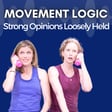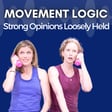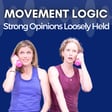
27: Our Big A-Has From the First Season
Welcome to Episode 27 of the Movement Logic Podcast! This is our last episode of the season!
In this episode, Laurel and Sarah reflect on their top three takeaways from season 1 of the Movement Logic Podcast. You’ll have to listen to the episode to hear what they are! We also discuss:
- How podcasting for the first time went for both of us, what was challenging, specifically.
- How science asks us to hold ideas loosely and remain a student (rather than fact holder and disseminator of facts).
- Why the language we use to talk about our bodies or our students’ bodies—and the re-education around using more positive, optimistic language—is so crucial to our ability as teachers to actually help our students feel better.
- The problem with all-or-nothing type thinking when it comes to better understanding a topic or finding the truth.
- Why publishing your learning process can be the best way to learn.
Reference links:
Episode 19 Oh, NO! Nose Breathing & Nitric Oxide
Episode 20 Pelvic Floor In-Depth with Stephanie Prendergast, MPT
Episode 16 Training the Non-Traditional Athlete with Rosalyn Mayse, AKA Roz the Diva
Episode 12 Movement Fads and Myths: Interview with Jules Mitchell MS, CMT, E-RYT 500
Episode 7 Is Pain Automatically Bad?
Episode 8 A Perimenopause Perspective with Trina Altman PMA, E-RYT 500
Episode 17 Pros & Cons of Using Resistance Bands
Sign up here for the Movement Logic Newsletter for course discounts and sales and receive a free mini Pelvic Floor course!
Watch the video of this conversation at: www.movementlogictutorials.com/podcast
Want more Movement Logic?
- Follow us on IG: @movementlogictutorials
- Get on our mailing list for tons of free content
- Contact us (we're super friendly)
Thanks for listening!


